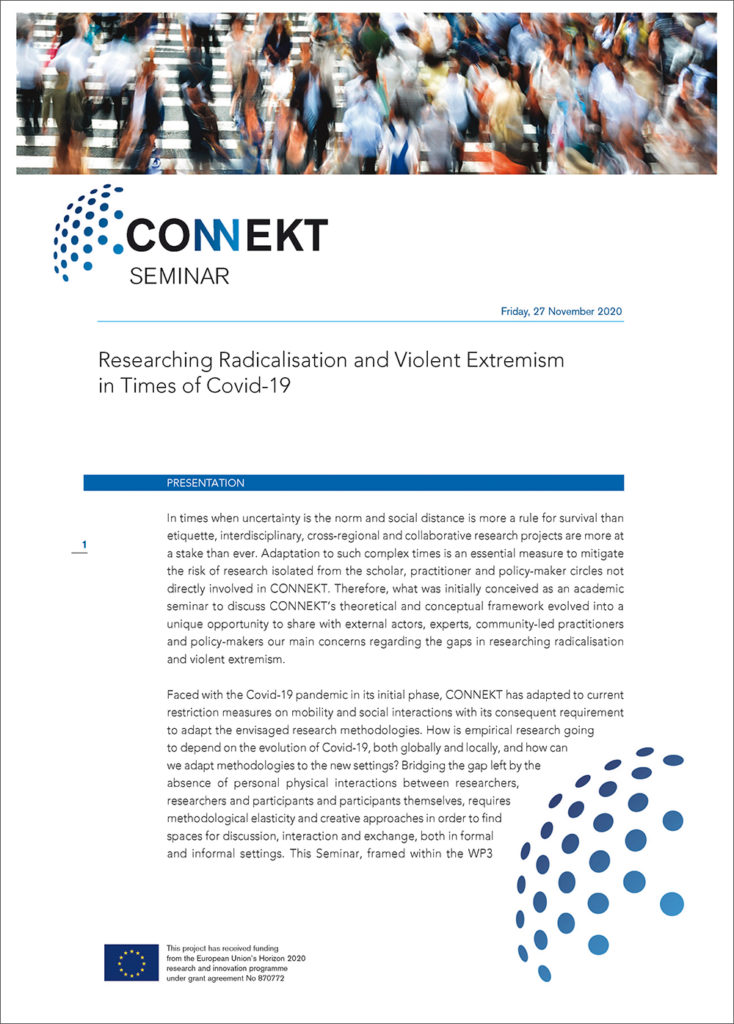In times when uncertainty is the norm and social distance is more a rule for survival than etiquette, interdisciplinary, cross-regional and collaborative research projects are more at a stake than ever. Adaptation to such complex times is an essential measure to mitigate the risk of research isolated from the scholar, practitioner and policy-maker circles not directly involved in CONNEKT. Therefore, what was initially conceived as an academic seminar to discuss CONNEKT’s theoretical and conceptual framework evolved into a unique opportunity to share with external actors, experts, community-led practitioners and policy-makers our main concerns regarding the gaps in researching radicalisation and violent extremism.
Faced with the Covid-19 pandemic in its initial phase, CONNEKT has adapted to current restriction measures on mobility and social interactions with its consequent requirement to adapt the envisaged research methodologies. How is empirical research going to depend on the evolution of Covid-19, both globally and locally, and how can we adapt methodologies to the new settings? Bridging the gap left by the absence of personal physical interactions between researchers, researchers and participants and participants themselves, requires methodological elasticity and creative approaches in order to find spaces for discussion, interaction and exchange, both in formal and informal settings. This Seminar, framed within the WP3 “Tacking Stock of Baseline Research” of the CONNEKT project, was precisely an attempt to create a first informal discussion setting where researchers, stakeholders and policy-makers could connect and interact in a fluid environment.
The parallel sessions provided a space for discussion within the frame of each level of analysis (macro, meso and micro) reaching a vivid and concise brainstorming of ideas, questions and concerns that will serve to prepare the ground for the next research stages. However, and more importantly, Covid-19 has an impact on the daily lives of all participants involved, adding new variables to the equation that the project attempts to understand: What drives young people to radicalisation and violent extremism in the Middle East and North Africa (MENA) and Balkan regions? Is the pandemic a new emerging driver or does it intensify or interact with other socio-economic, religious or technological drivers?
There is growing literature on how violent groups are seizing the pandemic to enhance their capabilities, both in recruiting and operating. At the same time, restrictions and exceptional laws lead to a legitimate concern about the potential harmful effects they have on the freedoms and liberties of citizens, which become much more acute in fragile or authoritarian settings. Polarisation of the political spectrum, instrumentalisation of the pandemic and the increase of intolerance and socio-economic divides as a result of the crisis are signals that the equation to understand the drivers of radicalisation and violent extremism might become far more complicated in the near future.
After four parallel sessions, devoted to discussing the seven pre-determined drivers of radicalisation and violent extremism from the macro (national and transnational), meso (community) and micro (individual) levels, and a fourth one dealing with prevention, a joint debate addressed the fundamental question of the repercussions for the European Union (EU). Particularly involving policy-makers and other institutional representatives that constitute potential targets of CONNEKT’s research results, the final session expressed expectations, needs and potential applications of CONNEKT’s research providing a particular EU perspective.
The valuable contributions of all participants, nourished with their own experiences in the field, revealed the complexity of the phenomenon by covering different points on the globe, from the MENA region to the Balkans, the Sahel and obviously Europe.
The event was jointly organised by the IEMed and the ULB (as WP3 leader) and involved, among other external stakeholders, researchers from other H2020 sister projects, and other members of the CONNEKT Consortium.
Home » Publications » Researching Radicalisation and Violent Extremism in Times of Covid-19

Reports
Researching Radicalisation and Violent Extremism in Times of Covid-19
19 February 2021

